- Home
- William Goldman
The Novels of William Goldman Page 2
The Novels of William Goldman Read online
Page 2
Soon she was screaming too.
For a short period after the funeral there were no changes in the life at Library Place. Then one morning the gardener didn’t come; a high-school boy was hired to mow the lawn. Two months later Charlotte let the maid go. There was no money coming in now, no money coming in. They had always lived beyond Hank’s income and probably Charlotte should have given up the big house sooner, but she determined to keep it, working desperately, cutting corners, cleaning and patching and cooking until finally, eight months after the death, Charlotte, exhausted, found a new place to live, the first floor of a yellow frame house on Nassau Street, close to the center of town.
Deborah wept as her mother packed her clothes. “Now, Deborah Crowell Firestone, you stop that, hear?” Charlotte said in her soft Southern voice. Aaron stood silently in the doorway of Deborah’s room, watching. “Oh, baby,” Charlotte sighed, opening her arms. “You come to me.” Deborah ran into her mother’s arms. Charlotte rocked her gently, back and forth. “It’s all right, baby, hear? Mother’s going to make it all all right. Everything’s going to be wonderful, baby. Mother promises. Mother loves you and she swears it’s going to be all right. Mother loves—”
Aaron crept into the room.
“Get out,” Deborah said.
Charlotte said, “Now, Deborah, you stop talking that way.”
“Get out,” Deborah repeated.
“Aaron is your brother. Aaron is my son. Aaron is a part of this family. Have you packed your games, Aaron?”
“No.”
“Well, maybe you better pack your games, do you think?”
Aaron turned and said, “All right.”
“And stay out,” Deborah called after him.
The yellow frame house on Nassau Street was owned by Miss Alexandra Hamilton, an elderly lady who had been teaching high school in Princeton since before the First World War. Miss Hamilton had been married twice, both times to the same man, an irresistibly handsome plumber from Newark. He was still alive and plumbing, but after the second divorce Miss Hamilton resumed her maiden name. She met Charlotte and the children as they moved in, set down the law of the land—“There is to be no noise”—and promptly departed to the second floor via the outside stairway, which she always used. They heard her occasionally, going in and coming out, but they saw her only once a month, when she stopped by for the rent.
Shortly after Aaron was five, Charlotte went out and got a job. The money from the sale of the white colonial was going much too quickly, so one morning she combed her long black hair, put on her best white hat—from behind she looked like a school girl—and left the house “to seek her fortune,” as she told her children, giggling nervously while she said it. “When she returned to the house several hours later she reported that she had “acquired the enormously responsible position” of saleslady at the Browse-Around, an expensive shop on Nassau Street catering to girls and young women. From that day on she seemed forever to be talking about the Browse-Around, about style and color and cost and the women who brought their little girls in for clothing and how much they spent and “not one of ’em’s as pretty as you, Deborah; not one holds a candle to you.” A month after she had been at the store she brought home a playsuit for Deborah. It was marked down, she said, and, besides, she had her employee’s discount, and a week after the playsuit came a dress, and then there followed other dresses, and pajamas and shoes and gloves and socks and blouses and coats and hats.
Aaron began to read.
All the time, lying on his bed, his thin arms holding the books upright on his stomach, his thin fingers turning the pages. He was tall and bony and long, and he ate only when forced. He had no interest in food. Charlotte forbade his reading at the table and at night she forced him to turn out his bed light and sleep. He would obey partially, lying still, waiting for her to go to bed. Then he would read into the night until his eyes burned.
One hot summer day when he was seven Aaron Firestone sat on his bicycle, staring hypnotically at the traffic on Nassau Street. The street was crowded; the cars seemed hardly to be moving at all. A truck lumbered noisily toward his house. The truck stopped, then started again, but slowly, slowly. Aaron pushed hard on the foot pedal and the bike left the sidewalk and skidded over the curb, down into the hot street. Aaron fell backward, balance gone. The truck braked, stopping, but not before its great wheels roiled up and over Aaron’s legs.
He awoke in the hospital to find his mother leaning over him, weeping. Looking away from her tears, he muttered, “I’m sorry, Mama.” Charlotte sobbed aloud, reaching for her son, cradling him. Hidden beneath the folds of Charlotte’s dress, Aaron found himself smiling.
He was in the hospital over a month. Charlotte came to visit every day and sometimes Deborah came too, but mostly it was just his mother. Aaron got to like it in the hospital until Charlotte told him that his hips had been damaged, crushed somehow by the truck, and he would be able to walk again, not well, probably not without some pain, but he would be able to walk.
Aaron started practicing with crutches. Then canes. Finally he was able to move unaided. It hurt, a lot at first, and the pain never completely left him, especially when he was tired, but by the time they brought him home from the hospital he walked by himself.
It was a steaming afternoon, and Charlotte, first seeing that Aaron’s needs were accounted for, excused herself and hurried to the Browse-Around. Deborah appeared briefly, wearing a new dress, and she modeled it for Aaron before going down the street to play. Aaron lay on his bed and tried to read. The room was very hot. His throat felt dry and there was a different dryness deep behind his eyes, and perspiration poured off his thin face.
Aaron shut his book and his eyes. He lay perfectly still until a fly buzzed near him. He lunged for it, missing, but managing by the sharpness of his movement to cause his hips to hurt. Aaron bit his lip until the pain was gone. Then, taking a deep breath, he moved slowly off the bed to the telephone. When he got the Browse-Around he asked for his mother, and when he got her he said, “Did you ask me to call you? I forgot.”
“Aaron, whatever—”
“I couldn’t remember if you asked me to call you at the store to tell you how I was or not, I’m fine.”
“Good. Of course you are.”
“I’m reading this book. It’s a very thrilling adventure story.”
“It’s my son,” Charlotte said.
“What?” Aaron said.
“I was just explaining who you were to Mrs. Cavanaugh, Aaron. Mrs. Cavanaugh is buying the cutest—”
“I loved Deborah’s new dress.”
“Oh, good. Aaron? Thank you for calling; I’m very glad you called—”
“Bye-bye, Mama,” Aaron said, hanging up. He moved back to his bed and lay down. Then he got up and walked very slowly out of the room, out of the house. On the sidewalk, he paused for a moment to stare at the spot where the truck had hit him. Aaron turned and, forcing his legs to obey, began to limp along Nassau Street. He was sweating terribly and his legs hurt more and more with each slow step, but he dragged himself along.
Almost an hour later he reached the white house on Library Place. Aaron stopped. In the yard he saw three children playing, and their high laughter reached him on the thick summer air. He hated to cry—his father never cried—but suddenly he was crying, bitterly, painfully, out of control. Aaron dropped to the cement sidewalk and wept. When he was done, he vowed not to let it happen again.
His word was good for close to twenty years.
The days that followed proved easily endurable. He read books. Quickly at first, but by training himself he increased his natural speed until, by the time he was twelve, he could finish almost any book in a single day. He began to draw, his thin fingers fluttering hurriedly across white notebook paper, leaving behind an accurate image of a tree or a gun or an elegant car. He taught himself to play the piano even though he never had a lesson. Deborah got the lessons, one each week from a university student wh
o didn’t really need the money but who liked to look at Deborah for an hour each Tuesday; even at fourteen, Deborah was something to see. During the lessons Aaron would stand outside the living-room door, never making a sound—he was good at that; he would regularly frighten his mother by appearing suddenly in doorways or dark halls, making her spin around, making her gasp. And while the lesson went on inside, Aaron would listen, and when the university student said “Cup your hands, no, relax them, relax them,” Aaron would cup and relax his hands. Then, when the student was gone, he would rush to the piano and practice. He had a good ear. Deborah had none, but the lessons continued for more than a year because Charlotte felt the playing of Chopin to be a minimum basic requirement for any young lady worthy of the name. By the end of the year, Aaron could play. So he played, and he read, and he drew.
But his greatest love was writing.
He had begun to write quite by accident. He had been to the movies alone one night and, as was his ritual, he crept silently into the house. When he heard his mother’s voice he stopped.
“I’m worried about Aaron,” Charlotte said.
Deborah grunted.
“What are we going to do about Aar—stop fiddling with your nails and help me, Deborah—he’s your flesh-and-blood brother after all.”
“That,” Deborah said, “is not my fault.”
“He should go out with other people more,” Charlotte said.
Deborah laughed. “What other people? Aaron’s a joke, Mother. I just dread having him in high school with me next year.”
“People shouldn’t laugh at Aaron,” Charlotte said. “Why do they?”
“Look at him. He’s ninety feet tall and his clothes never look like they fit and he thinks he’s so smart and he’s all the time appearing behind your back like a spook. He’s a nut, Mother. I’m ashamed to be seen with him and that’s the truth.”
“If only your father had lived,” Charlotte said. “If only he hadn’t—”
Aaron slammed the front door.
“Is that you, Aaron?” Charlotte called.
“Yes, Mother,” he answered.
“Howza flick?” Deborah asked him.
Aaron smiled. “Yummy.”
That night he drew a vicious picture of his sister. He looked at it. It wasn’t enough. He began to draw another picture, then, suddenly shifting from one form to another, he started writing. He wrote for hours. About Deborah. And Charlotte. Page after page, crushing them beneath the weight of his erudition, slashing the remains with his wit. It was nearly dawn when he finished. Aaron walked outside and waited for the sun. He felt wild.
He began writing character sketches of his fellow students, the shift into high school serving only to widen his choice of subject matter. He was protected from everyone now; as long as he had paper, he was safe. In school he was brilliant, and if his teachers were frightened of his habit of asking difficult questions, then smiling at them while they stumbled through an answer, they also admired his brilliance. His fellow students simply feared him. Sometimes, as he limped through the halls, he could hear them whispering about him. “That’s Debby Firestone’s brother. Him. Yeah. Can you believe it?” Whenever he met his sister on his way to class the pattern was always the same. She would do her best not to see him until he moved almost directly in front of her. Then she would smile. Aaron always smiled back.
He was a freshman in high school when he discovered his name. He was reading in study hall, doing his homework for the day, when he chanced across the names of the four elements: earth, air, fire and water. He studied the words. Earth, air, fire and water. Earth and air. Air and fire. He said them to himself. Air and fire. Aaron Fire. AARON FIRE. He shrieked. Heads turned to face him. AARON FIRE. That was his name. Aaron Fire the writer. He was Aaron Fire, the writer.
At last he knew his immortality was assured.
Charlotte decided the time had come for Deborah to get married. Deborah was eighteen, halfway through her senior year in high school, and there seemed little point in her going to college. Her grades in high- school had been barely average, and, more than that, what was the point of going to college when there were all the eligible young men right here in town, in Princeton. “And you must have an eligible man, my baby,” Charlotte said. “It has got to be an eligible man.”
“You mean rich,” Deborah answered.
Charlotte grabbed her daughter’s shoulders and turned her. They faced each other, standing close. “Now you hear me,” she whispered. “You listen to your mother. I want you to marry for love, you understand that? For love.” Charlotte smiled. “But you might as well fall in love with a rich man.”
And so the search for a suitor began. Not that there was any shortage of candidates; Deborah was pretty, with pale red hair and a lithe body, and boys flocked to the yellow house on Nassau Street. High-school boys and Princeton sophomores and even a few graduate students all the way from Columbia University. But the rich ones were too young and those old enough didn’t quite seem eligible enough.
Aaron watched it all, watched as his mother entertained the men in the living room while Deborah applied a final touch of lipstick, a last dab of perfume. Charlotte was at her most charming—she seemed to speak more Southern than in the past—as she gently probed the young men, inquiring as to their homes, their interests, their parents’ occupations. “Mr. Firestone was a fine lawyer,” she would begin. “Is your father by any chance in law?” Occasionally she would bring Aaron into use, calling to him as he stood by the wall outside the living room. “Oh, come in, Aaron. Do you know my son Aaron? Aaron’s the smart one in the family.” But always, after Deborah and her escort had gone, Charlotte would frown slightly, shaking her head. “Not for my baby,” she would mutter. “Not good enough for my baby.”
Generally her disapproval went only that far—a quick shake of the head. The one time it exceeded the limit was when Deborah went out with Dominic Melchiorre. He was a big man, broad and swarthy, and he came to the door wearing a striped double-breasted suit. Ill at ease, he stumbled through a few minutes’ conversation with Charlotte. Then he smiled at Charlotte—he had a dazzling smile, white teeth flashing against dark skin—and moved outside. “Tell Debby I’m in the car,” Dominic Melchiorre said. Charlotte watched him through the screen door as he got into an old sedan and began smoking. Deborah dashed after him a few minutes later. “Bye, Mama,” she said. “Don’t wait up.”
But Charlotte waited.
Aaron listened to the scene from his room. Deborah got home after three and Charlotte was ready. “An Italian?” she began. “I brought my daughter up so she could be escorted by an Italian? I bought my daughter clothes so she could look nice for a ... a ...”
“Say it,” Deborah urged.
“Catholic,” Charlotte said.
“I like him.”
“You like him. Oh, baby, you don’t know what you’re saying. What does he do?”
“He’s in the construction business.”
“Day laborer, you mean. A common sweating day laborer.”
“But like him.”
“There’s nothing to like! He does not exist. This did not happen. Not in our world. He is gone, hear? He is dead and forgotten and long, long gone. You tell me that. Deborah Crowell Firestone, you just tell me!”
There was a long quiet.
“Gone,” Deborah whispered then. “He’s gone.”
They wept that night. Both of them. When they retired to their bedrooms, Aaron could hear them weeping.
Aaron smiled.
Jamie Wakefield appeared the following week, as if divinely ordered. Charlotte met him first, at the Browse-Around. “This wonderful young man came in today,” she began, the minute she got home. “Listen to me, Deborah, while I tell you about him.”
“Who?” Deborah took her gum out of her mouth and began rolling it in her fingers.
“Jamie Wakefield, that’s what I’m trying to tell you. Jamie Wakefield, he bought a coat—Deborah, stop playing wit
h your gum this minute, hear?—a cashmere coat. For his mother. It’s her birthday and he bought her a one-hundred-percent cashmere coat just like that. We got to talking, and he is a real charmer and nice-looking and—”
“I’ll bet,” Deborah said.
“And it turns out he’s from Dallas. Well, I had his address, of course—he was sending the coat to his home—and you remember my cousin Millie—well, she lives in Dallas, has all her life, and she told me today—”
“You called her?” Deborah said. “To check up on this boy?”
“I did no such thing as check up on anybody. I owed Cousin Millie a letter—have for the longest time—so I called her to chat and if I happened to mention the Wakefield boy, well, I certainly don’t see anything unusual in that. Deborah, you’re going to love this Jamie Wakefield—I know it. I told him all about you—he’s very interested—he’s a pre-medical student and I mentioned how you loved biology and all. He’s coming on Friday to see you. I knew you’d be free, so I took it on myself—”
“I’m busy Friday,” Deborah began.
“Not anymore you’re not,” Charlotte said. “Not after what Cousin Millie told me today you’re not.”
“What did she say?”
“He’s eligible, baby. That’s what she said.”
Jamie Wakefield arrived promptly at seven o’clock on Friday, wearing a dark tweed coat, a dark tweed jacket and dark gray pants. Shy, obviously nervous, he waited with Charlotte and Aaron in the living room.
“I think the role of a physician is a noble one, Mr. Wakefield,” Charlotte said. “My husband, Mr. Firestone, was a lawyer. That’s noble too.”
“Yes, ma’m,” Jamie Wakefield said. He was of medium height, with brown hair and a bland, even face.
“My son Aaron here hasn’t decided yet what he wants to be, have you, Aaron?”
“Not yet,” Aaron lied. He had never told her about Aaron Fire. There was no point in telling; she would never have understood.
“Aaron’s the brains of our little family,” Charlotte went on. “Deborah’s got the beauty and Aaron’s got the brains.” She laughed softly. “I don’t know where I fit in.”

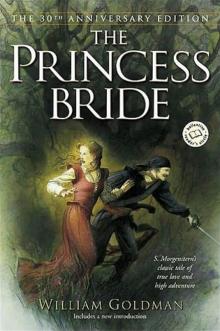 The Princess Bride
The Princess Bride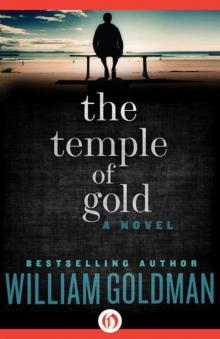 The Temple of Gold
The Temple of Gold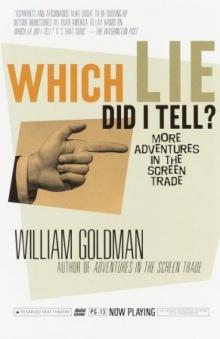 Which Lie Did I Tell?: More Adventures in the Screen Trade
Which Lie Did I Tell?: More Adventures in the Screen Trade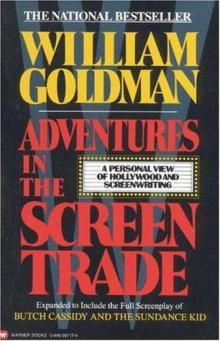 Adventures in the Screen Trade
Adventures in the Screen Trade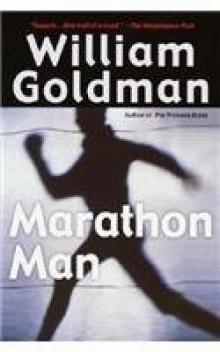 Marathon Man
Marathon Man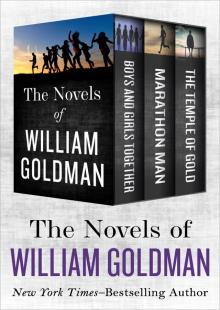 The Novels of William Goldman: Boys and Girls Together, Marathon Man, and the Temple of Gold
The Novels of William Goldman: Boys and Girls Together, Marathon Man, and the Temple of Gold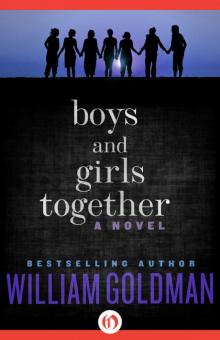 Boys and Girls Together: A Novel
Boys and Girls Together: A Novel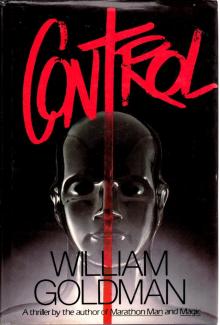 Control
Control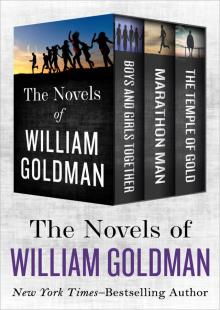 The Novels of William Goldman
The Novels of William Goldman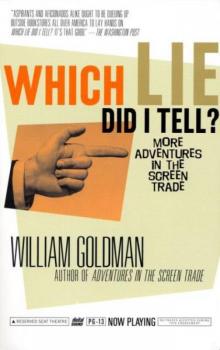 Which Lie Did I Tell?
Which Lie Did I Tell?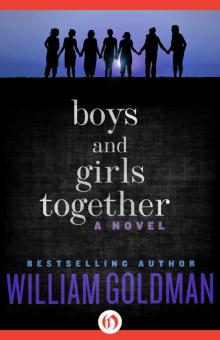 Boys & Girls Together
Boys & Girls Together